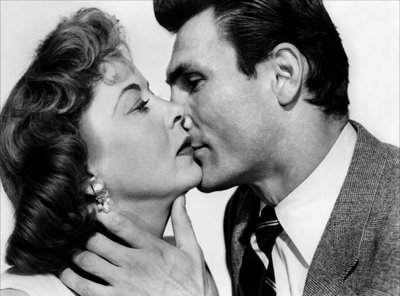
THE BIG KNIFE
(Il grande coltello, USA/1955) R.: Robert Aldrich. D.: 111'. V. inglese
The Big Knife è tratto da un dramma di Clifford Odets che ha ottenuto un certo successo a Broadway e che Jean Renoir ha intenzione di allestire su un palcoscenico. [...] Ci si può chiedere se vale la pena di filmare drammi soprattutto se ci si priva dei vantaggi del libero adattamento come in questo caso. Credo tuttavia che sia naturale che un cineasta, interessato alla tecnica della sua arte e con in più una certa esperienza teatrale, sia tentato di piegare un testo di una certa tenuta letteraria forgiandolo con le infinite possibilità del découpage cinematografico. [...] Aldrich con il suo lirismo, la sua modernità, il suo rifiuto della volgarità, con il suo desiderio di universalizzare e stilizzare i soggetti che affronta, con il suo senso dell'effetto ci fa pensare costantemente a Jean Cocteau e a Orson Welles, i cui film, evidentemente non ignora. L'azione di The Big Knife avanza non per il gioco dei sentimenti né per quello delle azioni ma - e la cosa è più rara e più bella - per definizione morale dei personaggi. Man mano che il film procede, il produttore è sempre più produttore e la divetta sempre più divetta fino alla lacerazione e alla tragedia finale. I film di questo genere richiedono un'interpretazione eccezionale e in questo siamo perfettamente soddisfatti da Jack Palance, Ida Lupino, Shelley Winters e soprattutto da Rod Steiger che interpreta magnificamente il ruolo di un produttore patriota e democratico, feroce e sentimentale, assolutamente delirante. Oltre a presentare un affresco molto esatto di Hollywood, The Big Knife è il film americano più raffinato e intelligente che abbiamo visto da molti mesi a questa parte.
François Truffaut, I film della mia vita, trad. it. di Antonio Costa, Marsilio, Venezia 1978
The Big Knife is adapted from a play by Clifford Odets which had some success on Broadway, and which Jean Renoir plans to bring to the Paris stage. [...] We may well wonder if it is interesting to make films out of plays, especially, as in this case, if the director doesn't allow himself to adapt them freely. I believe it's natural for a filmmaker, fascinated by the technique of his own art as well as possessing experience in the theater, to be tempted to stamp and embellish a play with a certain literary quality, shaping it by using the endless possibilities of cinematic editing. [...] With his lyricism, his modernity, his contempt for the slightest vulgarity, his desire to universalize and stylize the subjects he treats, Aldrich's effects remind us constantly of Jean Cocteau and Orson Welles, whose films he cannot have missed seeing. The action of The Big Knife is moved forward not by the interplay of emotions or of actions, but only - and this is both rare and more beautiful - through exploration of the moral construction of the characters. As the film progresses, the producer becomes more and more the producer, the starlet more and more the starlet, until the moment of shock and explosion at the end. Films of this kind need exceptional acting, and in this case we are more than satisfied by Jack Palance, Ida Lupino, Shelley Winters, and especially Rod Steiger, who plays the producer magnificently. He is a patriot, a democrat, both fierce and sentimental, completely mad. Aside from presenting a very exact picture of Hollywood, The Big Knife is the most refined and intelligent American film we have seen for a number of months.
François Truffaut, The Films in My Life, transl. by Leonard Mayhew, Simon & Schuster, New York 1978
Aria condizionata
Info: 051224605











